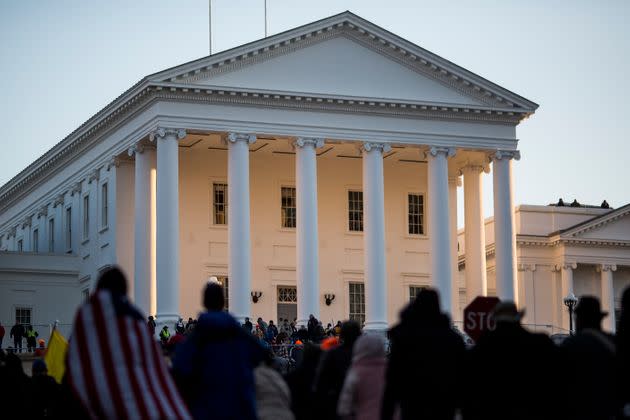Republicans Flip Virginia House of Delegates In Devastating Blow To Democrats
- Oops!Something went wrong.Please try again later.
- Oops!Something went wrong.Please try again later.

Republicans regained majority control of the Virginia House of Delegates in Tuesday’s election, ending Democrats’ brief hold on a chamber they’ve used to score some of the party’s biggest legislative wins nationwide over the last two years.
Democratic House of Delegates Speaker Eileen Filler-Corn conceded Friday night that the GOP would hold majority control of the chamber next year, The Associated Press reported. The AP and state election officials have not yet made official calls in every legislative contest, but the GOP will hold at least a 51-49 advantage in the body.
“While the results of the election were not in our favor, our work for the people of Virginia goes on,” Filler-Corn said.
Democrats entered Tuesday holding a 55-45 majority in the lower chamber of the Virginia state legislature, meaning Republicans needed to flip five seats to deadlock the body and six to regain control. By the end of election night, it was clear the GOP had won enough seats to at least create a tie the legislature, and the party is on track to pick up at least one more win. Republicans successfully defended all of their incumbents, and swiped seats from Democrats across the state.
Republican control of the House of Delegates will be a major asset for Gov.-elect Glenn Youngkin, who defeated Democrat Terry McAuliffe on Tuesday night.
The loss will cost Democrats their majority in one of the most important legislative chambers they flipped during Donald Trump’s presidency. In 2019, Democratic gains in the northern Virginia suburbs, the Richmond area and along the state’s southeastern coast allowed the party to take total control of the Virginia state legislature for the first time in a generation. The national party gained a foothold in the South, and the commonwealth’s blue future seemed to be cemented.
Democrats still hold a 21-19 majority in the Virginia state Senate, which won’t hold its next elections until 2023. But on issues like abortion rights, that thin advantage may not be enough to hold the line and block legislation that comes out of the GOP House.
Democrats will also have to rely on their narrow state Senate majority to counter potential GOP efforts to curb voting rights. Three Republican candidates who were in Washington, D.C., for the “Stop the Steal” rally that preceded the deadly Jan. 6 insurrection at the U.S. Capitol won elections to the House of Delegates. Two were incumbents, and the third, Del.-elect Marie March, touted her attendance at the rally during her campaign.
Other conservative lawmakers have indicated that the outcome will lead to a renewed push for the sort of conspiracy theory-driven election audits that have already taken place in Arizona and are underway in other states, sparking fears among Democratic lawmakers that the GOP will attempt to roll back its expansions of early and weekend voting and seek to implement broader voting restrictions like those that 19 other Republican-controlled states have made law this year.
Losing the House of Delegates will halt the ambitious legislative agenda Democrats have advanced over the last two years, which they were hoping to build on in future sessions. It will also likely exacerbate broader concerns about the party’s ability to maintain power in state legislatures, which have powered the GOP’s aggressive moves to the far right over the last decade.
Virginia Democrats had pushed the state in the opposite direction. Over the last two years, they have passed new laws that expanded abortion access, bolstered voting rights, implemented gun control policies, created new LGBTQ protections, raised the minimum wage, abolished the death penalty and sought to transition the state off of fossil fuels and address climate change.
Before they fully took control, Democrats also successfully expanded Medicaid, a change that allowed nearly 500,000 Virginians to access health care through the federal program, according to official figures.
Back in power, Republicans could seek to reverse many of those policies — particularly with Youngkin in the governor’s mansion.
Democrats knew holding the majority would be tough, given that they had taken control by winning key districts that had long supported Republicans and voted for Trump in the 2016 presidential election. But they entered the final stages of the race somewhat confident they would maintain their hold on the House of Delegates.
It’s the latest disappointment at the state level for a party that has suffered plenty of them. Although Democrats picked up 200 state legislative seats and flipped eight chambers during Trump’s presidency, that only began to make up for the losses they suffered over the previous eight years, when the GOP picked up nearly 1,000 such seats across the country.
Virginia’s House of Delegates is already the third of those eight bodies to sink back into GOP hands, after New Hampshire Republicans regained control of both chambers in 2020, a year in which Democrats failed to flip a single legislature despite pouring record resources into such races.
Still, the damage could have been worse: Dels. Wendy Gooditis, a vulnerable northern Virginia Democrat, and Schuyler VanValkenburg, who represents a suburban Richmond district, successfully defended their seats despite major GOP challenges. Del. Elizabeth Guzmán, another northern Virginia Democrat targeted by Republicans, also held on to her seat.
Early analyses of vote totals suggest that Democratic legislative candidates in key races may have outperformed McAuliffe, the party’s gubernatorial nominee, according to the States Project, a progressive group that said six of the eight candidates it endorsed in Virginia outpaced McAuliffe.
That’s a marked difference from 2017, when Democratic legislative contenders ran behind the top of the ticket even as they picked up 16 seats in the House of Delegates, and 2020, when Democratic victories in the presidential race and key statewide contests didn’t translate to major gains in legislatures. And it may foster at least some hope in Democrats and progressives that their renewed focus on state legislatures could pay off in more favorable environments.
Next year’s midterm elections were already going to pose challenges for the party, especially after a tough redistricting cycle in which Republicans controlled most state legislatures. Democrats have eyed Pennsylvania, Arizona and Michigan as potential opportunities to flip GOP-held legislatures.
But if the political environment that drove the losses in Virginia remains the same, they may have to focus on protecting existing majorities in states like Maine and Colorado.
That will be even more important in 2022, as GOP state legislatures continue to serve as an launchpad for the party’s most anti-democratic whims. Republican efforts to limit voting rights and exert partisan influence over the management, oversight and even certification of elections have generated fears that the party could seek to use its legislative dominance to undermine future elections in ways it failed to last year, when Trump and the GOP attempted to contest the results of an election he lost.
“Virginia shows yet again that the radical right understands what’s at stake in state legislatures,” said Simone Leiro, a spokesperson for the States Project. “2022 is our last chance to finally learn that lesson ― or it will be proven when these majorities refuse to certify the election in 2024.”
This article originally appeared on HuffPost and has been updated.




